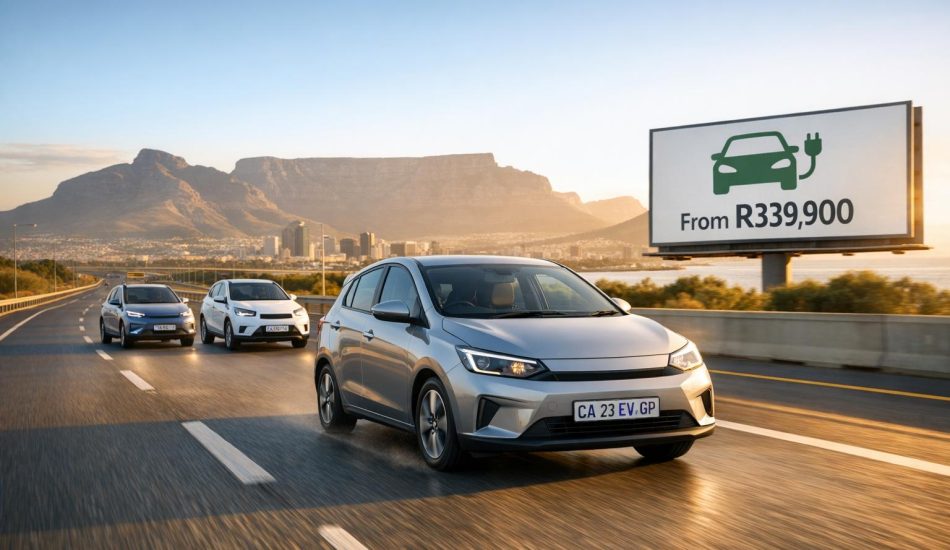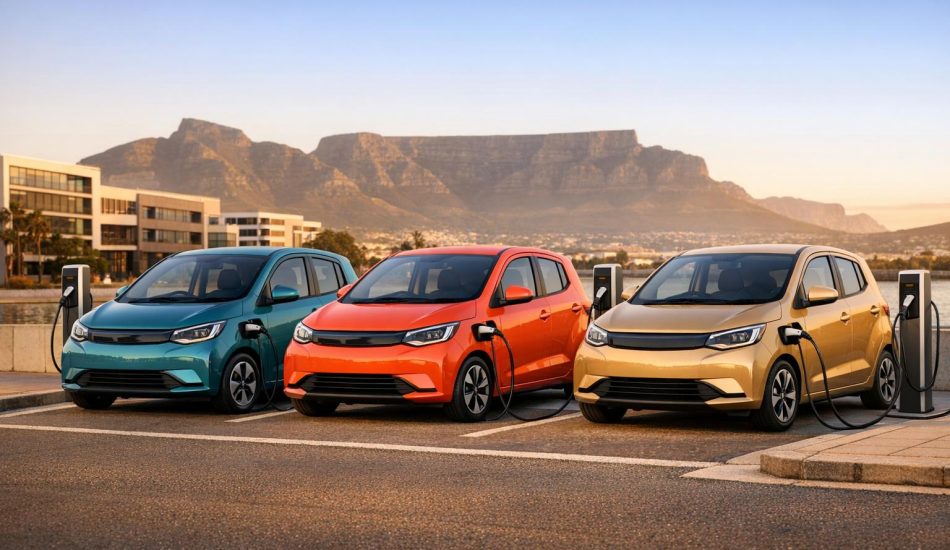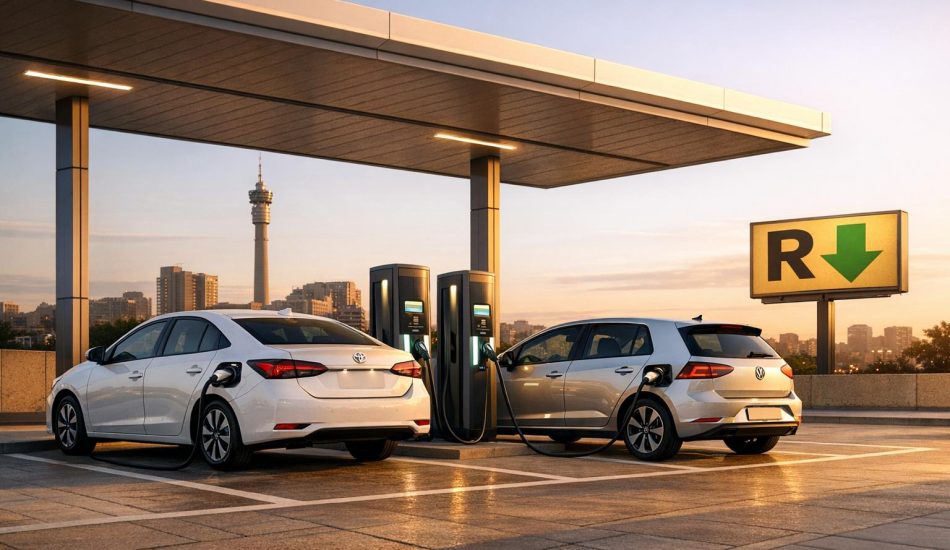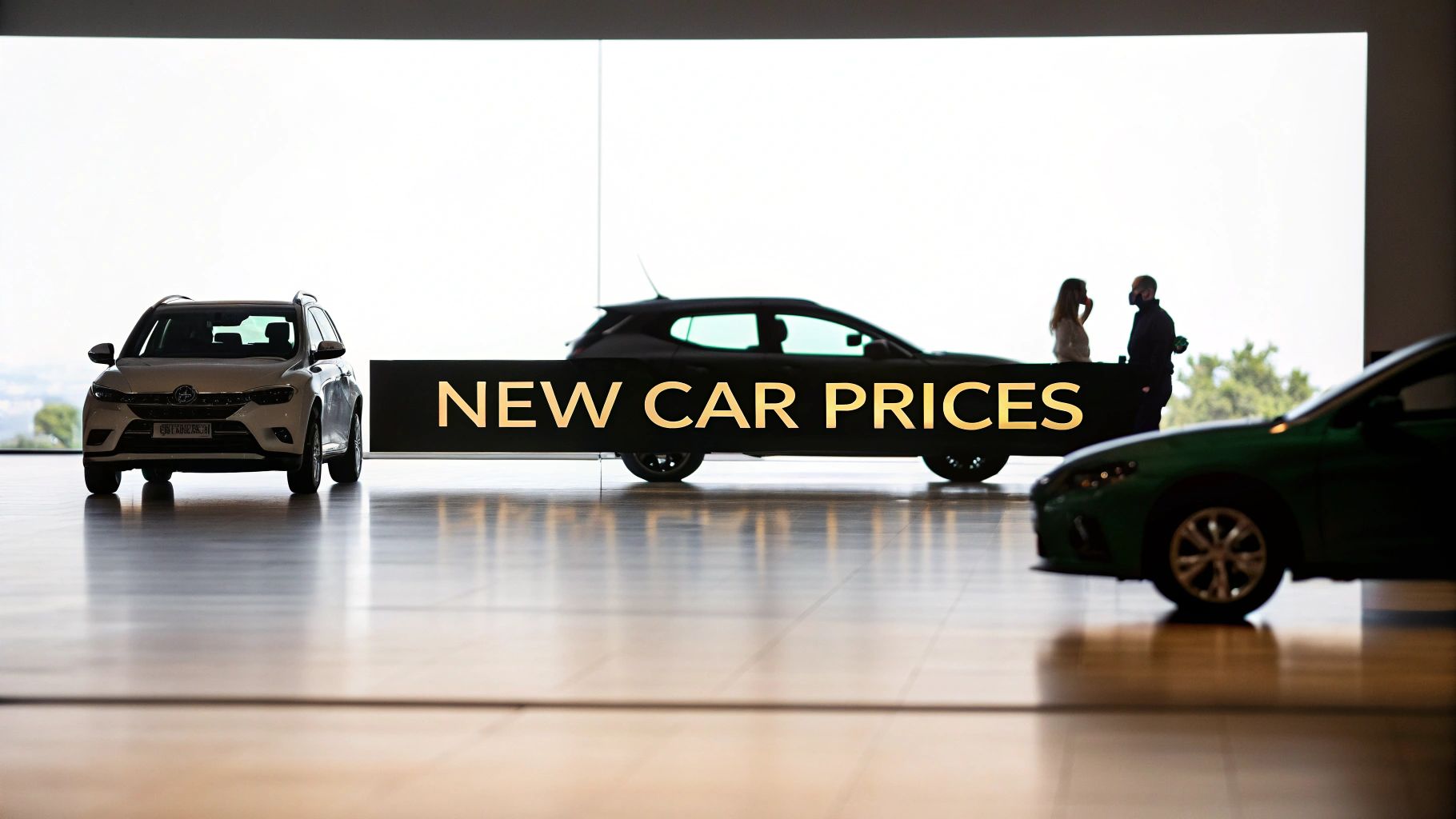
Buying a brand-new car in Nigeria is a major financial commitment, and prices can swing wildly depending on the brand, model, and whether it’s imported or locally assembled. For context, a popular new sedan might set you back anywhere from ₦18 million to over ₦30 million, a clear sign of a market influenced by a mix of economic realities and government policy.
Decoding the Nigerian New Car Market
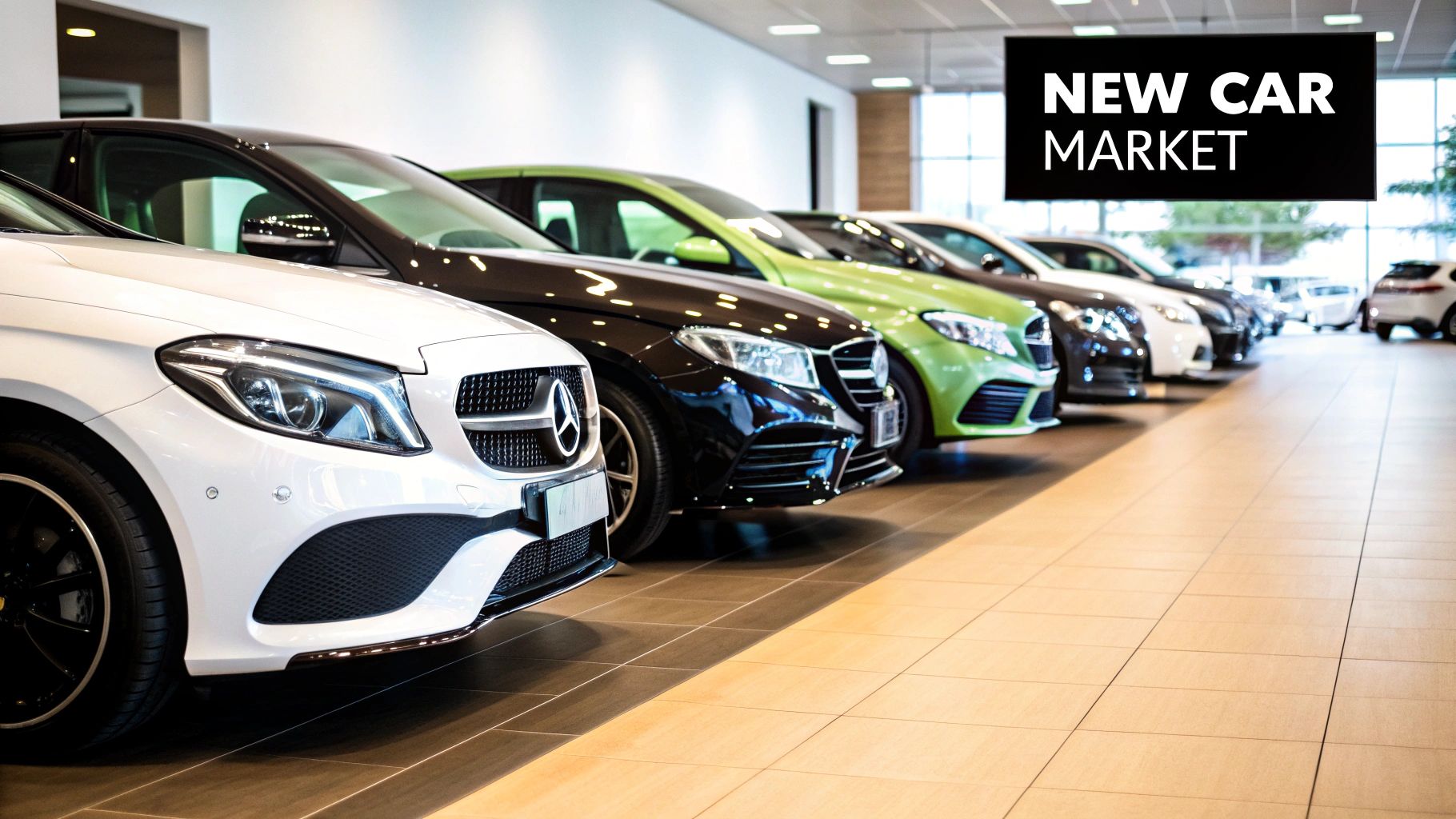
To really get a grip on new car prices here, you have to look beyond the shiny sticker on the windscreen. The final price tag isn't just one number; it's a stack of different costs piled on top of each other long before that car ever rolls into a showroom. The manufacturer’s suggested retail price is just the very first layer.
From that starting point, a whole host of other factors come into play, each bumping the price up a little more. These forces create a uniquely challenging market for buyers, so it's crucial to understand what you’re actually paying for.
Core Factors Influencing Vehicle Costs
The journey a new car takes to reach a Nigerian buyer is paved with financial hurdles. While they aren't always visible to the final customer, they have a massive impact on both the availability and affordability of new vehicles.
Here are the main drivers you absolutely need to know about:
- Import Duties and Tariffs: These government taxes are easily one of the biggest additions to a car's cost. The official policy is to encourage local assembly plants, so fully imported cars get hit with heavy duties.
- Fluctuating Exchange Rates: Nearly all new cars sold in Nigeria are paid for in foreign currency, usually US dollars. When the Naira weakens, the landing cost for every single vehicle shoots up immediately. It's a direct and painful correlation.
- Global Supply Chain Issues: We're still feeling the ripple effects of global manufacturing delays and shipping bottlenecks. When demand is high but only a few cars are available, prices naturally climb.
- Local Assembly vs. Fully Imported: Cars put together in Nigeria can sometimes be cheaper because they sidestep some of the hefty import taxes. However, this isn't always the case, as many of their components are still imported.
For example, the price of a brand-new Toyota can change dramatically from one month to the next based purely on these market conditions. If you're interested in the nitty-gritty, you can learn more about how the Nigerian automotive market is shaped by these variables in this detailed research from Global Monitor.
Buying a new car here is less about the car's base price and more about its journey. Each step—from the factory to the port and through customs—adds another layer to the final cost.
To help you get a clearer picture, let’s break down some typical price brackets.
A Quick Look at Price Ranges
Here’s a table that gives you a high-level overview of what you can expect to pay for a new car in Nigeria today. Think of it as a baseline to help you match your budget to the right type of vehicle before you start shopping.
Estimated New Car Price Ranges in Nigeria by Vehicle Type
| Vehicle Type | Popular Brands | Estimated Starting Price Range (NGN) |
|---|---|---|
| Compact Sedans | Toyota, Hyundai, Kia | ₦18,000,000 – ₦30,000,000 |
| Crossover SUVs | Honda, GAC, Changan | ₦25,000,000 – ₦45,000,000 |
| Full-Size SUVs | Toyota, Ford, Lexus | ₦50,000,000 – ₦120,000,000+ |
| Luxury Sedans | Mercedes-Benz, BMW | ₦70,000,000 – ₦150,000,000+ |
Remember, these figures are just starting points. The final price will always depend on the specific trim level, optional extras, and the dealership you buy from.
The Hidden Forces Driving Car Prices Up
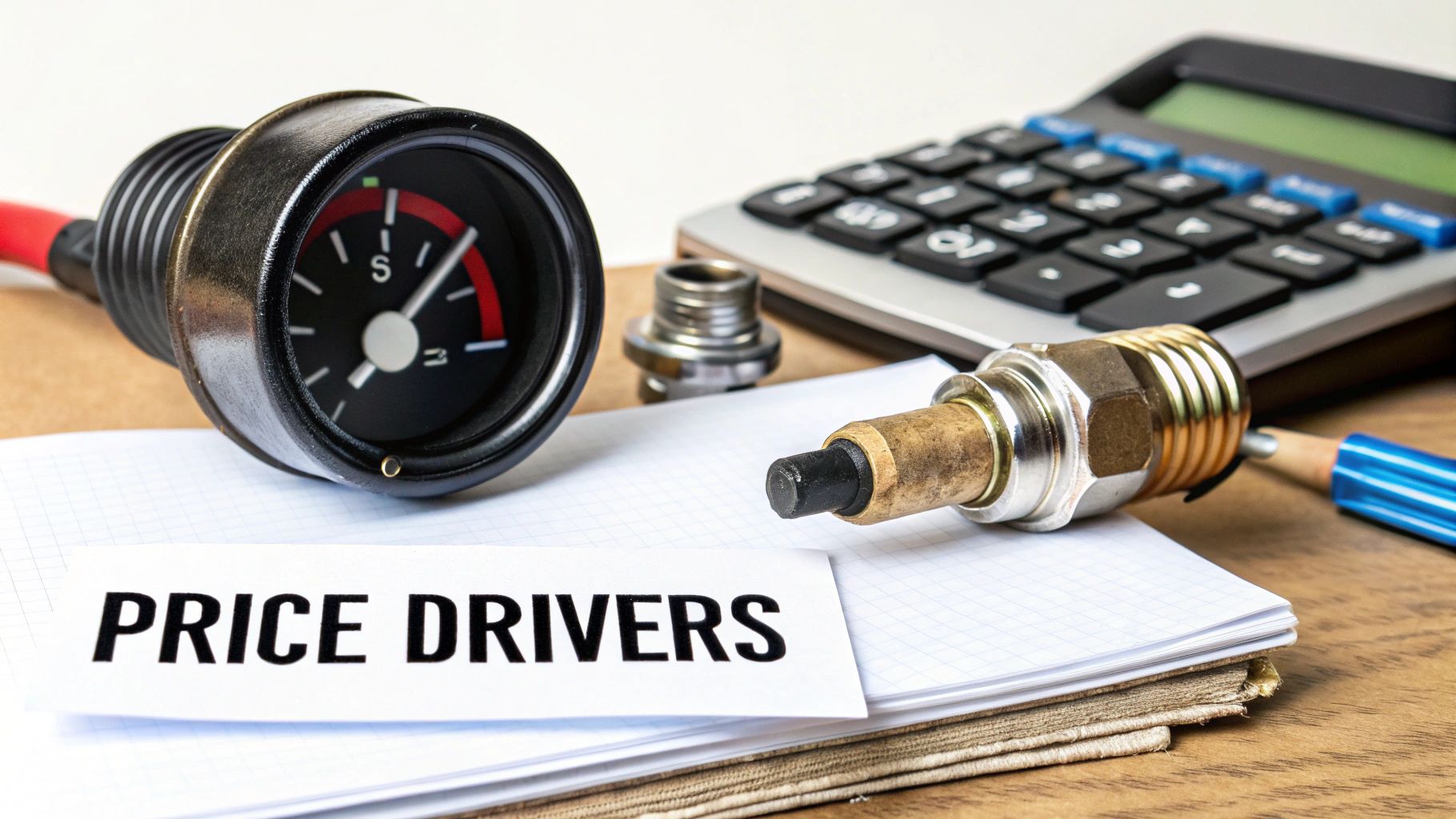
Ever look at the price of a brand-new car in Nigeria and just shake your head, wondering why it’s so much higher than in other parts of the world? You’re not alone. That final showroom price isn’t just pulled out of thin air; it’s the end result of some powerful economic and logistical forces all working together.
Getting a handle on these factors is the key to understanding the true cost of putting a new vehicle on Nigerian roads. Think of it like this: the price starts as a small stream at the manufacturer's factory. But as it flows towards you, it's fed by several other streams—taxes, shipping costs, and currency drama—and by the time it reaches the showroom, it’s a full-blown river.
Let's break down these hidden forces one by one to see exactly how they inflate the final price you pay.
The Currency Exchange Rate Rollercoaster
Right off the bat, the biggest and most immediate factor is the currency exchange rate. New cars aren't made in Nigeria, so dealers have to buy them in foreign currencies, usually US dollars. This directly ties the car’s final cost to the ever-shifting value of the Naira.
Imagine the exchange rate is a financial tide. When the Naira is strong, the tide is low, making it cheaper to bring in goods. But when the Naira weakens, that tide comes rushing in, lifting the cost of everything imported. A car that cost $30,000 yesterday could suddenly cost millions of Naira more today, simply because the exchange rate moved.
This constant fluctuation turns car pricing into a moving target for dealers and a huge headache for buyers. A price you were quoted last month might be completely out of date by this week, all thanks to what’s happening in the foreign exchange market.
Government Tariffs: The Mandatory Gate Fee
Another huge chunk of the final cost comes from the Nigerian government’s import duties and tariffs. These are basically taxes slapped on vehicles brought into the country, with the stated goal of protecting and encouraging local car assembly.
Think of it as a mandatory "gate fee" that every single imported car has to pay just to enter the country. The National Automotive Industry Development Plan (NAIDP) imposes some hefty tariffs on Fully Built Units (FBUs), which can be as high as 70% of the car's original value when you combine the duty and the levy.
The sticker price of a new car is often just the beginning. Import duties and levies can sometimes nearly double the manufacturer's original price before the car even reaches the dealership.
This policy has a massive impact on what people can afford. While the aim is to boost local production, it makes fully imported cars incredibly expensive for the average person. As regulations change, especially for newer technologies like electric vehicles, staying informed is critical. You can learn more about how these rules are adapting in our guide on Nigeria's EV import rules for 2025.
Global Supply Chain Ripples
The world's automotive supply chain is a massive, complicated web of manufacturers, parts suppliers, and shipping networks. A small problem in one corner of that web can create big waves that eventually crash onto the shores of a dealership in Lagos or Abuja.
We've all seen how fragile this system is lately. A few examples really bring it home:
- Microchip Shortages: The global scramble for semiconductor chips brought car production to a crawl worldwide, creating intense scarcity.
- Shipping Congestion: Major international ports got so jammed up that it caused huge delays and sent freight costs through the roof.
- Raw Material Costs: The price of steel, aluminium, and other basics shot up, making it more expensive to build the cars in the first place.
When global supply gets tight but demand here in Nigeria stays strong, prices have nowhere to go but up. Dealers have to pay more to get their hands on a limited number of cars, and that extra cost gets passed right on to you. It's a stark reminder that a factory issue in Asia or a shipping problem in Europe can directly hit your wallet when you're trying to buy a new car.
How Brand Popularity Shapes Your Purchase Price
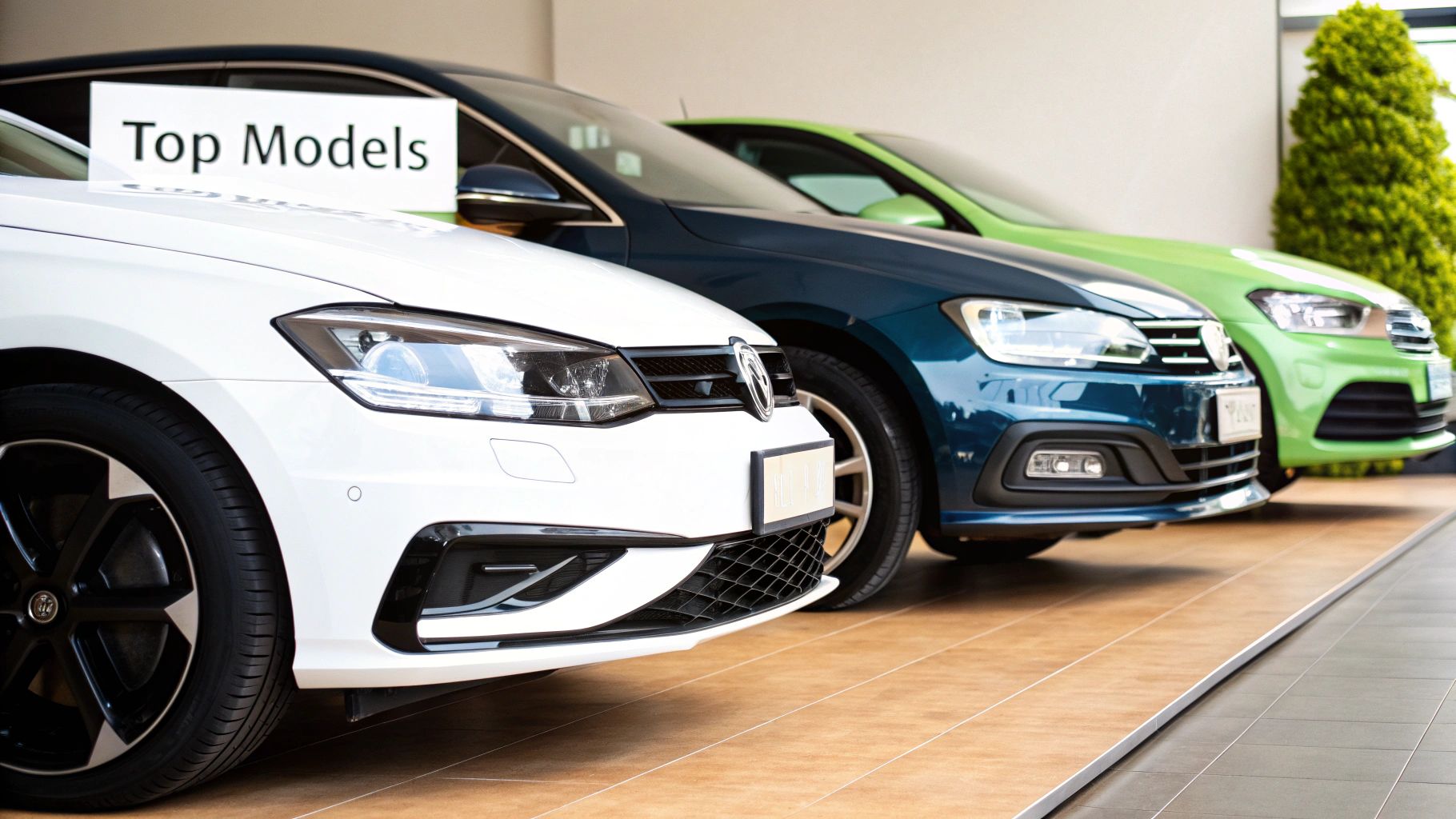
When you start looking for a new car in Nigeria, you’ll quickly find that the name on the front of the car often matters as much as what's under the bonnet. Brand reputation isn't just about marketing fluff; it's a massive factor that directly impacts the price you pay. In our market, some brands command a premium simply because they’ve earned the public's trust over decades.
This isn’t just a feeling; it’s a core driver of the new car prices in Nigeria. Think of it like a stock market for cars—brands with a rock-solid reputation for reliability and durability trade at a higher value. They don't have to fight as hard for your money because, in many ways, they've already won your confidence.
The Power of Perception and Resale Value
Let's be honest, one name stands head and shoulders above the rest in Nigeria: Toyota. For years, it has been the undisputed king of reliability. Toyotas are seen as tough, dependable vehicles that can handle our roads without falling apart, and when they do need a fix, parts are cheap and every mechanic knows them inside and out.
This perception creates a powerful financial incentive. Everyone knows that a Toyota holds its value incredibly well. So, while you might pay more upfront, you're also buying peace of mind, knowing you’ll get a good chunk of that money back when it’s time to sell. This strong resale value makes the initial high price feel more like an investment than an expense.
Car dealers know this better than anyone. They understand the immense demand and see no reason to offer big discounts. In fact, they use the high resale value as a selling point to justify the sticker price.
Market Dynamics and Competitive Pricing
Of course, not every brand has Toyota's Midas touch. This is where things get interesting for a smart buyer. Newer brands, or those trying to shake off a poor reputation, have to work much harder to get your attention. They can't rely on their name alone, so they compete on price and features.
To win you over, a challenger brand might try a few different tactics:
- Aggressive Pricing: They'll often price their cars significantly lower than the equivalent model from a market leader.
- Feature-Packing: You might find their cars loaded with tech, comfort, and safety features that would cost you a fortune as optional extras on more established brands.
- Attractive Warranties: A long and comprehensive warranty is a great way for a newer brand to say, "We stand behind our product, even if you don't know us yet."
These brands are hungry for market share, and they're willing to offer you more car for your money to get it. A perfect example is the arrival of electric vehicle makers like BYD, which are making waves with advanced technology. You can see what they offer in our deep dive on BYD car prices in Nigeria.
A brand's current market position is a key indicator of potential deals. A company experiencing a sales dip is far more likely to offer incentives than one struggling to keep up with surging demand.
The latest market data tells this story perfectly. In the first half of 2025, total vehicle sales in Nigeria actually dropped by 18.4%. Yet, Toyota defied the trend, growing its market share to 26.4%. On the other hand, Hyundai’s sales plunged by 46.1%, which could mean more room for negotiation on their forecourts. Meanwhile, an up-and-comer like MG saw its sales skyrocket by 60.6%, proving that a smart strategy can make a huge impact.
Keeping an eye on these market shifts can give you a real edge when it's time to buy.
A Practical Price Breakdown by Car Segment
Trying to get your head around new car prices in Nigeria can feel a bit like navigating a maze without a map. To really make sense of it all, we need to break the market down by vehicle type. Each category is built for different needs, different lifestyles, and, crucially, different budgets.
From small city runners to big family wagons, the price tags can swing wildly. This breakdown will walk you through the most common car segments, giving you a clear picture of popular models and what you can expect to pay. Think of this as the first step in matching your budget to your driving needs, so you can find the right car without any nasty surprises.
To put things in perspective, this chart compares average new car prices in Nigeria against South Africa and the UK. It gives you a sense of where we stand globally.
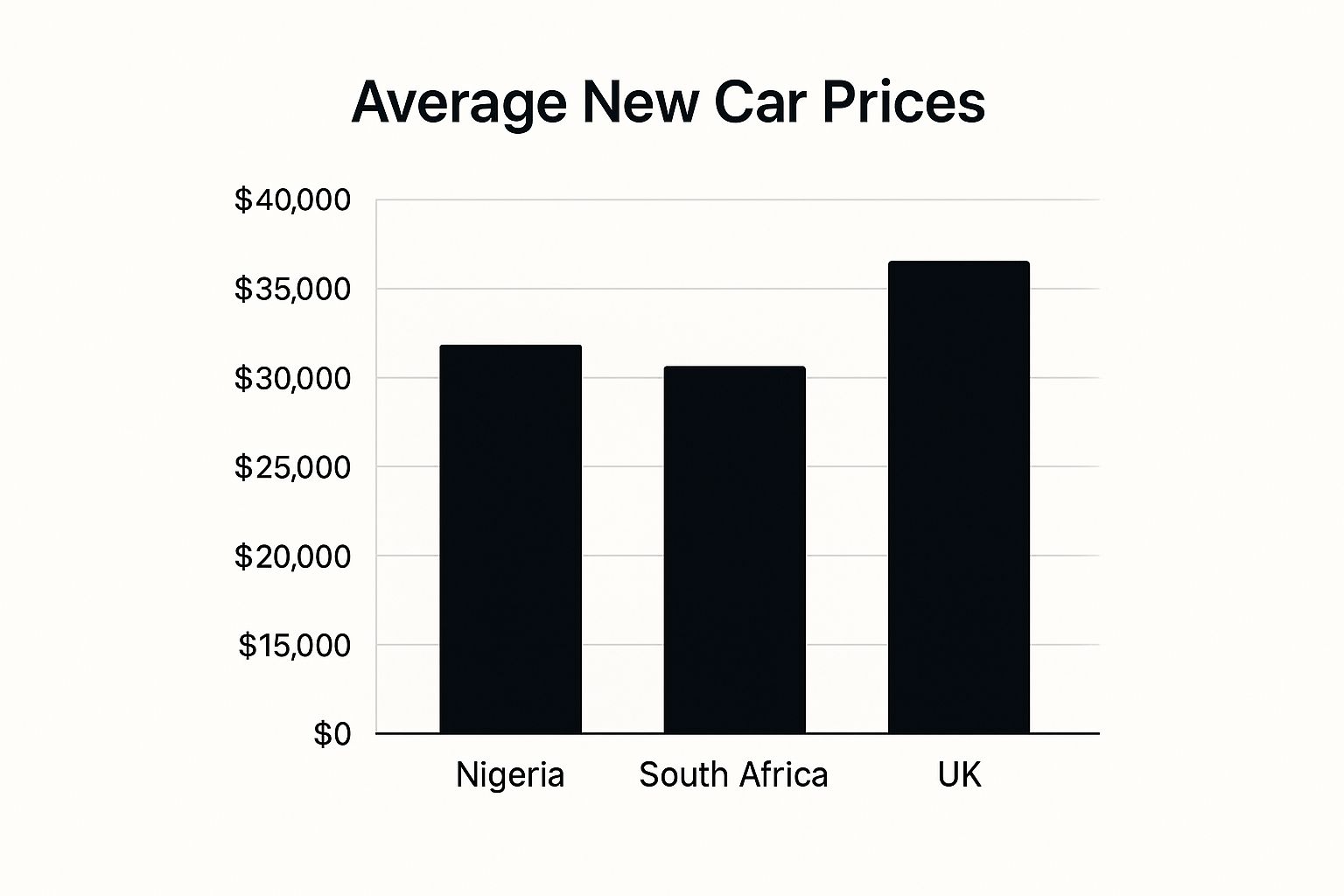
As you can see, while our prices aren't too far off from a market like the UK, they're significantly higher than in South Africa. This really highlights how much local import duties and economic factors shape what we pay at the dealership.
Compact Cars and Sedans
Compact cars and sedans are the backbone of Nigerian roads. People love them for their solid fuel efficiency, easy-to-handle size, and relatively cheap maintenance. They're the go-to choice for the daily grind in bustling cities like Lagos or Abuja, striking a smart balance between comfort and cost-effectiveness.
These cars are a fantastic fit for first-time owners, small families, or any professional needing a reliable ride to weave through city traffic. Plus, their lower running costs make them a wise financial decision over the long haul.
A few mainstays you’ll see everywhere:
- Toyota Corolla: It's a legend for a reason. Unbeatable reliability and it holds its value like nothing else.
- Hyundai Elantra: Turns heads with its sharp design and comes packed with features for the price.
- Kia Cerato: A strong contender that offers a great warranty and modern tech, making it a very tempting option.
For a brand-new model in this class, you should budget anywhere from ₦18,000,000 to over ₦35,000,000. The final price really comes down to the brand’s reputation, the specific trim level, and what features are included.
Crossover and Mid-Size SUVs
The crossover SUV segment has absolutely taken over the market, and it's easy to see why. They offer the perfect compromise: the comfort of a sedan with the practical, can-do attitude of an SUV. With more ground clearance for our varied roads, extra cargo space, and a higher driving position, they just make sense for Nigeria.
These vehicles are a hit with growing families and anyone who wants more flexibility than a standard car can provide. They handle the school run and a weekend getaway with equal confidence.
Some of the popular models on the road are:
- Kia Seltos: A crowd-pleaser known for its bold looks and a cabin full of tech.
- Honda HR-V: Praised for its incredibly smart use of interior space and rock-solid performance.
- GAC GS4: A challenger brand that’s gaining ground by offering a lot of car for the money.
Pricing for a new crossover typically starts around ₦25,000,000 and can push past ₦50,000,000 for high-end versions from the big names.
Full-Size SUVs and Luxury Vehicles
When you need maximum space, power, and road presence, you step up to a full-size SUV. These machines are built for large families, executive transport, or tackling tough terrain without breaking a sweat. They come with three rows of seating, powerful engines, and all the luxury trimmings.
The buyers here are looking for top-tier comfort, safety, and capability. The brands in this space, like the legendary Toyota Land Cruiser and the plush Lexus RX series, command a premium because of their bulletproof engineering and prestige.
To make comparing these options easier, here’s a quick overview of how the segments stack up.
New Car Price Comparison Across Major Segments
| Car Segment | Popular Models | Average Price Range (NGN) | Best For |
|---|---|---|---|
| Compact Sedans | Toyota Corolla, Hyundai Elantra | ₦18,000,000 – ₦35,000,000 | City commuting, fuel efficiency, first-time buyers |
| Crossover SUVs | Kia Seltos, Honda HR-V | ₦25,000,000 – ₦50,000,000 | Small families, versatility, mixed-road conditions |
| Full-Size SUVs | Toyota Land Cruiser, Ford Explorer | ₦50,000,000 – ₦120,000,000+ | Large families, luxury, off-road capability |
As the table shows, the price for these bigger vehicles reflects their impressive capabilities. You’re looking at a starting point of ₦50,000,000, with top-of-the-line models easily soaring past ₦120,000,000. It’s a serious investment, but for the right owner, it's worth every naira.
Budgeting for Costs Beyond the Sticker Price
That shiny price tag in the showroom? It's just the starting point. It's a common mistake for first-time buyers to fixate on that number, only to get hit with a wave of other essential costs before they can even drive away. Getting a handle on these extras is the key to setting a realistic budget and avoiding any nasty surprises.
Think of it this way: the sticker price is what you pay for the car itself. The "on-the-road" price is what you pay to actually own and drive it legally in Nigeria. This final figure bundles in several non-negotiable fees you simply can't skip. Factoring them in from day one gives you the true cost of your investment.
Deconstructing the On-The-Road Cost
So, what are these extra costs? They’re the necessary evils of car buying, and you need to break them down to see the full picture. Be prepared, as these can easily add 10% or more to your total bill.
Here are the big ones you absolutely must plan for:
- Vehicle Registration and Licensing: This is the official paperwork that gets your car into the government's system. It covers your number plates from the Federal Road Safety Corps (FRSC) and other state-level documents. Without this, you can't legally be on the road.
- Comprehensive Insurance: While basic third-party insurance is the minimum legal requirement, no one buying a new car stops there. You need comprehensive cover to protect your massive investment against theft, accidents, fire, and other potential disasters. The premium is almost always calculated as a percentage of the car's value.
- Dealer Handling and Prep Fees: You might see this listed as a "delivery charge." It’s what the dealership charges to cover the logistics of getting the car from the port, doing a final mechanical check (called a pre-delivery inspection or PDI), and getting it cleaned and ready for you.
- Initial Bits and Bobs: This isn't a government fee, but it's smart to have a little extra set aside. Think about practical things like floor mats, a car cover to protect your new paint, or a security tracking device—which many insurance companies now insist on.
The difference between the price you see in an advert and the final amount you pay can be huge. Always, always ask the dealer for a full "drive-away" or "on-the-road" price quote that lists every single one of these charges.
A Practical Example of Total Cost Calculation
Let's run the numbers to see how this plays out in the real world. Say you've decided on a new crossover SUV with a listed price of ₦28,000,000.
Here’s a realistic breakdown of what you might actually pay:
- Sticker Price: ₦28,000,000
- Registration & Licensing: This varies between states, but a fair estimate is around ₦150,000.
- Comprehensive Insurance: Premiums usually sit between 3-5% of the vehicle’s value. Let’s use 4%, which comes to ₦1,120,000 for the first year.
- Dealer Prep/Handling Fees: A typical estimate for this would be about ₦100,000.
When you add it all up, your ₦28,000,000 car now has a true on-the-road cost of ₦29,370,000. That's an extra ₦1,370,000 you need to have ready. Knowing this from the start means your budget is built for reality, making the whole buying process a lot less stressful.
The Future of Electric Vehicle Pricing in Nigeria
The conversation around new car prices in Nigeria is starting to change, and you can hear the quiet hum of electric vehicles (EVs) in the background. While it’s still very much a niche market, there's no denying that EVs are the future of how we get around. Anyone who’s looked into buying one, however, quickly learns their pricing is a different ball game entirely, often coming with a hefty premium over standard petrol cars.
This higher upfront cost isn't just a number pulled out of thin air. It’s the result of a few major factors that create a real financial barrier for EVs in Nigeria today. The biggest culprit is the battery, which alone can make up a staggering 40% of the vehicle's total price. Until battery tech gets cheaper worldwide, this will remain a tough nut to crack. On top of that, with no local manufacturing, every single EV is imported, meaning it gets hit with the same hefty duties and forex headaches that push up the prices of all foreign cars.
Navigating the Road to Affordability
Despite these hurdles, the Nigerian government has made its ambitions clear: it wants to steer the country towards an electric future. They know that high prices are the single biggest obstacle, so several long-term policies are in the works to make EVs a more sensible option for the average car buyer.
These plans are designed to attack the cost problem from a few different angles:
- Potential Subsidies and Tax Credits: Financial incentives are a tried-and-tested way to get people on board. The government is looking at ways to knock down the final price for consumers, making that initial investment feel a lot less intimidating.
- Infrastructure Investment: A huge worry for any potential EV owner is the lack of charging stations. Building out a dependable national charging network is on the agenda, which will give people the confidence to make the switch.
- Encouraging Local Assembly: The ultimate game-changer would be to assemble EVs right here in Nigeria. This would slash import-related costs and lead to much more stable, predictable pricing.
The journey to affordable electric mobility in Nigeria is a marathon, not a sprint. It will take a concerted effort from both the government and private sector to create an ecosystem where EVs aren't just a luxury, but a practical choice for everyone.
As of early 2025, there were somewhere between 15,000 to 20,000 electric vehicles on Nigerian roads—a tiny drop in the ocean compared to the total number of cars. While the high cost is still a major roadblock, government plans to install thousands of charging stations and promote local manufacturing are aimed at bringing prices down and pushing those numbers up. You can read more about Nigeria's zero-emission targets in this report on climate policy.
Real-World Challenges and Future Outlook
While the vision is bright, the reality on the ground has its fair share of problems. The most immediate challenge is the charging network, which is still in its infancy. This creates "range anxiety"—the very real fear of your battery dying miles away from a charging point—and it’s a major turn-off for potential buyers.
On top of that, the high purchase price is a tough pill to swallow, even when you factor in the promise of lower running costs down the line. For EVs to really catch on, their sticker price needs to be competitive with their petrol-guzzling cousins. If you're curious about what's actually on the market, check out our detailed 2025 guide to buying electric cars in Nigeria, which breaks down the available models and their prices.
Looking ahead, the price of EVs in Nigeria is bound to drop. It’s just a matter of when. As global battery costs fall, local assembly ramps up, and government incentives finally kick in, we'll see those prices become more reasonable. They may seem out of reach now, but keeping an eye on these trends will help you figure out the perfect time to make the switch to electric.
A Few Common Questions We Hear All the Time
Buying a new car is a big deal, and naturally, you're going to have questions. Let's tackle some of the most common ones that come up when people are looking at new car prices in Nigeria. Getting these answers straight can help you walk into the dealership with more confidence.
Is It Cheaper to Import a Car Myself?
On the surface, it seems like cutting out the middleman should save you money. In reality, personally importing a car is a minefield of complexity and hidden costs. You'd be on the hook for everything: freight, insurance, clearing fees, and the big one—navigating Nigeria's customs duties. It's a headache.
Dealers, on the other hand, do this at scale. They have established processes and get better rates on shipping and clearing because they're bringing in containers, not just one car. Unless you're already in the import business, you'll almost certainly find that buying locally is the simpler, more predictable, and often cheaper option.
Can I Haggle on the Price with Dealers?
Absolutely, but your success will depend heavily on what you're trying to buy. If you've got your heart set on a high-demand vehicle like a Toyota Land Cruiser, the dealer knows they'll sell it quickly, so they won't be in a hurry to slash the price.
Your negotiating power increases with less popular models or when sales are slow. Here’s a pro tip: don't just fixate on the sticker price. Try asking them to throw in extras like a couple of free services, a set of floor mats, or even just a full tank of fuel. Every little bit helps.
A great way to start the conversation is by asking for the final "on-the-road" price. This forces all the extra costs out into the open, so you're negotiating the total amount you'll actually pay, not just an imaginary base price.
When Is the Best Time of Year to Buy a New Car?
Patience can definitely pay off. The end of the year, especially from October to December, is often a sweet spot. Dealerships are scrambling to hit their annual sales targets and need to make space for the next year's models, which can lead to some pretty attractive discounts.
Keep an eye out for special promotions around major holidays too. A bit of strategic timing can make a real difference and shave a significant amount off the final price of your new car.
Ready to explore the future of driving? At EV24.africa, we make the transition to electric mobility simple and transparent. Browse our curated selection of the latest electric vehicles and find your perfect match today. Visit us at https://ev24.africa to learn more.


